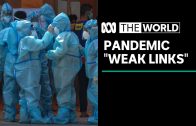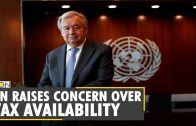Triple-mutant Covid variant from India is now a potential global health risk
A WHO official said Monday it is reclassifying the highly contagious triple-mutant Covid variant spreading in India as a “variant of concern” at the global level. Maria Van Kerkhove, the WHO’s technical lead for Covid-19, said the agency will provide more details in its situation report Tuesday. For access to live and exclusive video from CNBC subscribe to CNBC PRO: https://cnb.cx/2NGeIvi
A World Health Organization official said Monday it is reclassifying the highly contagious triple-mutant Covid variant spreading in India as a “variant of concern,” indicating that it’s become a global health threat.
Maria Van Kerkhove, the WHO’s technical lead for Covid-19, said the agency will provide more details in its weekly situation report on the pandemic Tuesday but added that the variant, known as B.1.617, has been found in preliminary studies to spread more easily than the original virus and there is some evidence it may able to evade some of the protections provided by vaccines. The shots, however, are still considered effective.
“And as such we are classifying this as a variant of concern at the global level,” she said during a press conference. “Even though there is increased transmissibility demonstrated by some preliminary studies, we need much more information about this virus variant in this lineage in all of the sub lineages, so we need more sequencing, targeted sequencing to be done.”
The WHO said last week it was closely following at least 10 coronavirus variants across the world, including the B.1.617. The variant was previously labeled a “variant of interest” as more studies were needed to completely understand its significance, Van Kerkhove said.
“What it means for anybody at home is any of the SARS-CoV-2 viruses circulating can infect you and spread and everything in that sense is of concern,” she said Monday. “So, all of us at home, no matter where we live, no matter what virus is circulating, we need to make sure that we take all of the measures at hand to prevent ourselves from getting sick.”
A variant can be labeled as “of concern” if it has been shown to be more contagious, more deadly or more resistant to current vaccines and treatments, according to the WHO.
The group issued a clarification Monday to their earlier remarks, saying that current data shows the existing Covid-19 vaccines “remain effective at preventing disease and death in people infected with this variant.”
The international organization has already designated three other variants with the classification: B.1.1.7, which was first detected in the U.K. and is the most prevalent variant currently circulating throughout the U.S.; B.1.351, first detected in South Africa, and the P.1 variant, first detected in Brazil.
» Subscribe to CNBC TV: https://cnb.cx/SubscribeCNBCtelevision
» Subscribe to CNBC: https://cnb.cx/SubscribeCNBC
» Subscribe to CNBC Classic: https://cnb.cx/SubscribeCNBCclassic
Turn to CNBC TV for the latest stock market news and analysis. From market futures to live price updates CNBC is the leader in business news worldwide.
The News with Shepard Smith is CNBC’s daily news podcast providing deep, non-partisan coverage and perspective on the day’s most important stories. Available to listen by 8:30pm ET / 5:30pm PT daily beginning September 30: https://www.cnbc.com/2020/09/29/the-news-with-shepard-smith-podcast.html?__source=youtube%7Cshepsmith%7Cpodcast
Connect with CNBC News Online
Get the latest news: http://www.cnbc.com/
Follow CNBC on LinkedIn: https://cnb.cx/LinkedInCNBC
Follow CNBC News on Facebook: https://cnb.cx/LikeCNBC
Follow CNBC News on Twitter: https://cnb.cx/FollowCNBC
Follow CNBC News on Instagram: https://cnb.cx/InstagramCNBC
https://www.cnbc.com/select/best-credit-cards/
#CNBC
#CNBCTV

























